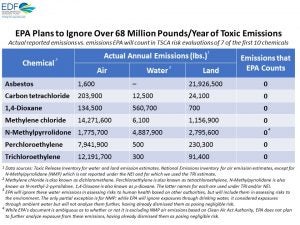Richard Denison, Ph.D., is a Lead Senior Scientist.
On Friday, Environmental Defense Fund (EDF) submitted a new set of extensive comments to the Environmental Protection Agency (EPA) in response to its March release of additional information on Pigment Violet 29 (PV29), the first chemical to undergo a risk evaluation under the Toxic Substances Control Act (TSCA) following the law’s amendment in 2016.
After EDF and others criticized both the dearth of health and environmental data on PV29, and EPA’s illegal withholding of those data, EPA released some additional information and opened a new comment period in mid-April. In releasing the new information, EPA was quick to judgment, asserting that “[t]he release of these studies does not change the Agency’s proposed ‘no unreasonable risk’ determination as concluded in the draft risk evaluation published in November.”
EDF’s 100 pages of comments in Round 1 enumerated the myriad ways EPA has failed to demonstrate that PV29 does not present unreasonable risk. Unfortunately, if anything, Round 2 has only deepened our concerns over the inadequacy of EPA’s risk evaluation. Read More
